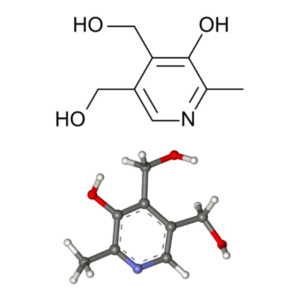The properties of Vitamin B6
Vitamin B6 (pyridoxine C8H11NO3). Ensures proper energy metabolism. It regulates the functioning of the endocrine system and maintains internal balance.
Though all B vitamins are essential, Vitamin B6 is one of the most important. It plays a role in over 100 enzyme reactions in the body, primarily in the metabolism of important amino acids and proteins. Vitamin B6 is one of the most common deficiencies.
Vitamin B6 (pyridoxine) is closely associated with the functions of the nervous, immune and endocrine systems. It also participates in the metabolic processes of proteins, lipids and carbohydrates. Pyridoxine deficiency may result in neurological disorders including convulsions and epileptic encephalopathy and may lead to infant abnormalities(301), (1122).
Recommended Daily Allowance
Vitamin B6 – Recommended Daily Allowance: 1.3/1.3 mg (1.7/1.5 mg >50 year).
Symptoms of Deficiency
Anaemia.
Specific Risk Factors for Deficiency
Alcohol abuse, age-related malabsorption, contraceptive medications.
Dietary Sources
Good Dietary Sources of Vitamin B6:
- meat,
- fish,
- eggs,
- legumes,
- nuts,
- bananas,
- potatoes.
Vitamin B2 and the Brain
Beyond its role as a necessary cofactor in the folate cycle, the role of vitamin B6 in amino acid metabolism makes it a rate limiting cofactor in the synthesis of neurotransmitters such as dopamine, serotonin, γ-aminobutyric acid (GABA), noradrenaline and the hormone melatonin. The synthesis of these neurotransmitters is differentially sensitive to vitamin B6 levels, with even mild deficiency resulting in preferential down-regulation of GABA and serotonin synthesis, leading to the removal of inhibition of neural activity by GABA and disordered sleep, behaviour, and cardiovascular function and a loss of hypothalamus-pituitary control of hormone excretion. Vitamin B6 also has a direct effect on immune function and gene transcription/expression and plays a role in brain glucose regulation. More broadly, levels of pyridoxal-5′-phosphate are associated with increased functional indices and biomarkers of inflammation, and levels of pyridoxal-5′-phosphate are down-regulated as a function of more severe inflammation, potentially as a consequence of pyridoxal-5′-phosphate’s role either in the metabolism of tryptophan or in one-carbon metabolism. This role is particularly pertinent as inflammatory processes contribute to the aetiology of numerous pathological states including dementia and cognitive decline(1262).
Brain Specific Symptoms of Deficiency
Irritability, impaired alertness, depression, cognitive decline, dementia, autonomic dysfunction, convulsions.













































































































